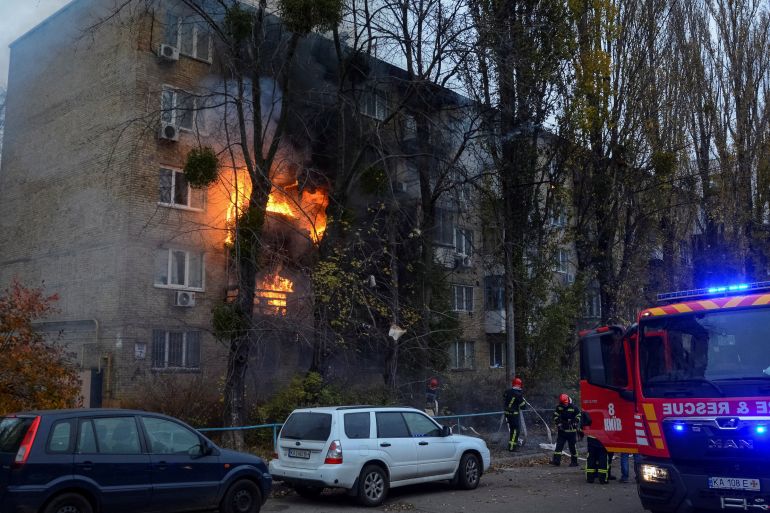Barrage of Russian missiles causes blackouts across Ukraine
Ukraine’s energy minister says the wave of attacks was the biggest bombardment of power facilities in war so far.

Russia has pounded Ukraine’s energy facilities with its biggest barrage of missiles yet, striking targets from east to west and causing widespread blackouts.
President Volodymr Zelenskyy said Russia fired at least 85 missiles on Tuesday, “most of them at our energy infrastructure,” and shut down power in many cities.
Keep reading
list of 4 itemsAt G20, divisions hinder bid to blame Russia for inflation crisis
Ukraine’s Zelenskyy urges G20 to adopt plan to end Russia’s war
What are world leaders saying about Russia and Ukraine at G20?
“We’re working, will restore everything. We will survive everything,” the president said.
His energy minister said it was “the most massive” bombardment of power facilities in the nearly nine-month-old Russian invasion.
The barrage of attacks came leaders of the Group of 20 nations met in Bali for a summit dominated by Moscow’s war on Kyiv. They also followed what have been days of euphoria in Ukraine after one of its biggest military successes in the nearly nine-month Russian invasion – the retaking last week of the southern city of Kherson.
As its battlefield losses mount, Russia has increasingly resorted in recent months to targeting Ukraine’s power grid, knocking out energy in several areas.
Al Jazeera’s Jonah Hull, reporting from Kyiv, said that the latest attacks are a clear attempt by Russia to “weaponise” the coming winter by leaving people in the cold and dark.
“The temperature is set to hit minus six [degrees Celsius – 21 Fahrenheit] later this month,” Hull said.
On Tuesday, more than a dozen Ukrainian regions reported attacks, which hit parts of cities including Kyiv, Lviv and Rivne in the west, Kharkiv, Ukraine’s second-largest city in the northeast, Kryvyi Rih, President Volodymyr Zelenskyy’s native city, and Poltava in the centre, Odesa in the south and Zhytomyr in the north.
In Kyiv, Mayor Vitali Klitschko said authorities found a body in one of three residential buildings that were struck, and said about half of the capital was without electricity.
The mayor of Lviv said power was down in the city and Kharkiv mayor Ihor Terekhov said critical infrastructure facilities had been damaged there, too.
“There are problems with energy supply. Overground electric transport and the metro have been stopped,” Terekhov wrote on Telegram.
Rivne governor Vitaliy Koval said there had been missile attacks but reported no casualties in his city.
Neighbouring Moldova was also affected from the attacks. It reported massive power outages after the raids knocked out a key power line that supplies the small nation, an official said.
Earlier on Tuesday, Zelenskyy told world leaders there would be no respite in Ukraine’s campaign to drive Russian troops out of his country.
“We will not allow Russia to wait it out, build up its forces, and then start a new series of terror and global destabilisation,” he said in an address by video link to a summit of the G20 major economies in Indonesia.
Following the barrage of Russian attacks, Andriy Yermak, chief of the presidential staff, wrote on Twitter, “Russia responds to @Zelenskiy’s powerful speech at #G20 with a new missile attack. Does anyone seriously think that the Kremlin really wants peace? It wants obedience. But at the end of the day, terrorists always lose.”
Russia responds to @ZelenskyyUa's powerful speech at #G20 with a new missile attack. Does anyone seriously think that the Kremlin really wants peace? It wants obedience. But at the end of the day, terrorists always lose.
— Andriy Yermak (@AndriyYermak) November 15, 2022
The attacks on Tuesday came as authorities were already working furiously to get Kherson back on its feet and beginning to investigate alleged Russian abuses there and its surroundings. The city’s remaining 80,000 residents are without heat, water or electricity, and short on food and medicine.
The head of the UN human rights office’s monitoring mission in Ukraine, Matilda Bogner, on Tuesday decried a “dire humanitarian situation” there.
Speaking from Kyiv, Bogner said her teams are looking to travel to Kherson to try to verify allegations of nearly 80 cases of forced disappearances and arbitrary detention.
The head of the National Police of Ukraine, Igor Klymenko, said authorities are to start investigating reports from Kherson residents that Russian forces set up at least three alleged torture sites in now-liberated parts of the wider Kherson region and that “our people may have been detained and tortured there.”
Zelenskyy likened the recapture to the Allied landings in France on D-Day in World War II, saying both were watershed events on the road to eventual victory.
But large parts of eastern and southern Ukraine remain under Russian control and Zelenskyy warned of possible more grim news ahead.
“Everywhere, when we liberate our land, we see one thing – Russia leaves behind torture chambers and mass burials … How many mass graves are there in the territory that still remains under the control of Russia?” Zelenskyy asked.